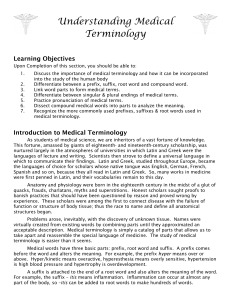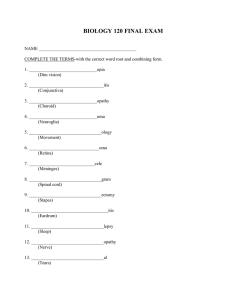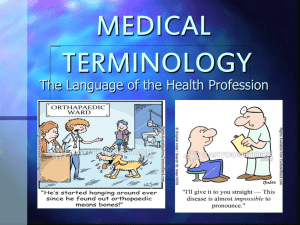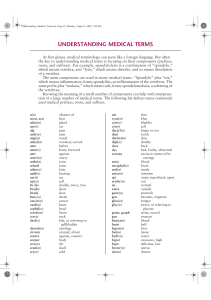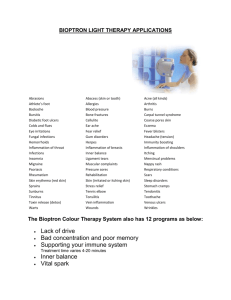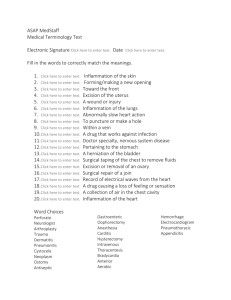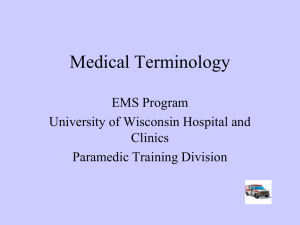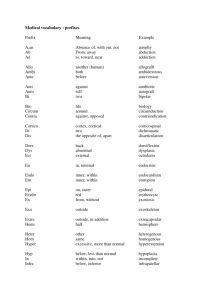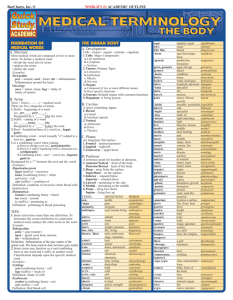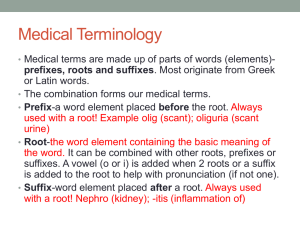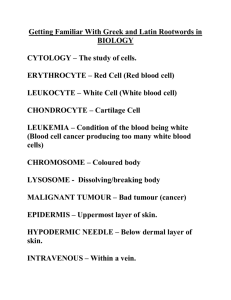Medical Terminology
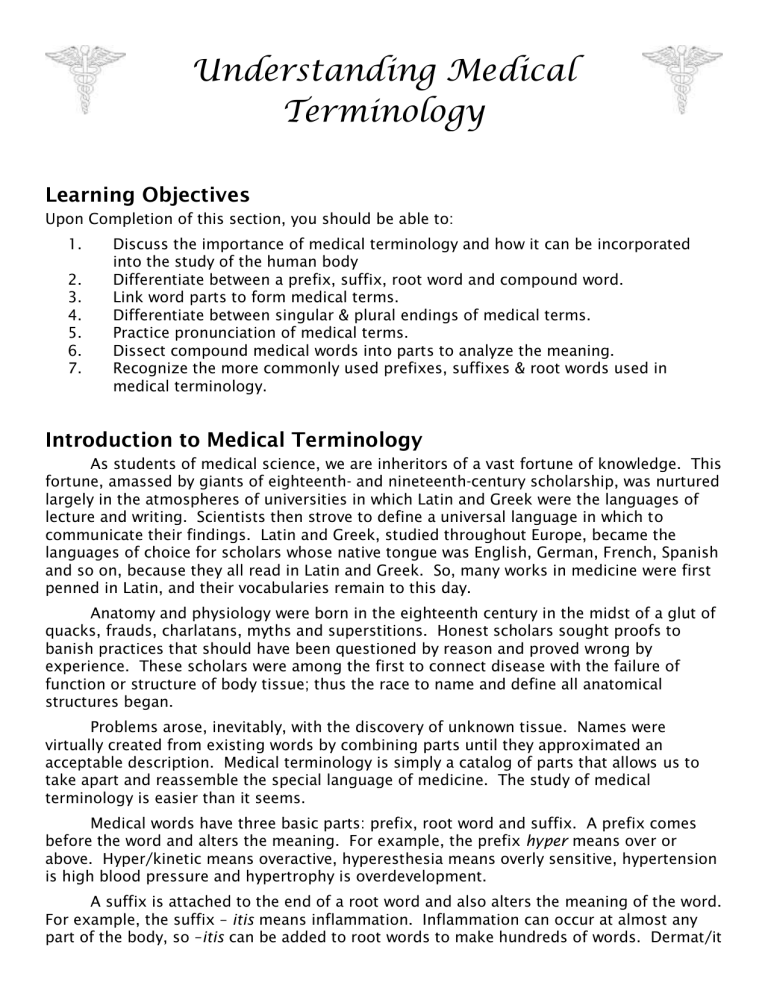
Understanding Medical
Terminology
Learning Objectives
Upon Completion of this section, you should be able to:
1.
Discuss the importance of medical terminology and how it can be incorporated into the study of the human body
2.
Differentiate between a prefix, suffix, root word and compound word.
3.
Link word parts to form medical terms.
4.
Differentiate between singular & plural endings of medical terms.
5.
Practice pronunciation of medical terms.
6.
Dissect compound medical words into parts to analyze the meaning.
7.
Recognize the more commonly used prefixes, suffixes & root words used in medical terminology.
Introduction to Medical Terminology
As students of medical science, we are inheritors of a vast fortune of knowledge. This fortune, amassed by giants of eighteenth- and nineteenth-century scholarship, was nurtured largely in the atmospheres of universities in which Latin and Greek were the languages of lecture and writing. Scientists then strove to define a universal language in which to communicate their findings. Latin and Greek, studied throughout Europe, became the languages of choice for scholars whose native tongue was English, German, French, Spanish and so on, because they all read in Latin and Greek. So, many works in medicine were first penned in Latin, and their vocabularies remain to this day.
Anatomy and physiology were born in the eighteenth century in the midst of a glut of quacks, frauds, charlatans, myths and superstitions. Honest scholars sought proofs to banish practices that should have been questioned by reason and proved wrong by experience. These scholars were among the first to connect disease with the failure of function or structure of body tissue; thus the race to name and define all anatomical structures began.
Problems arose, inevitably, with the discovery of unknown tissue. Names were virtually created from existing words by combining parts until they approximated an acceptable description. Medical terminology is simply a catalog of parts that allows us to take apart and reassemble the special language of medicine. The study of medical terminology is easier than it seems.
Medical words have three basic parts: prefix, root word and suffix. A prefix comes before the word and alters the meaning. For example, the prefix hyper means over or above. Hyper/kinetic means overactive, hyperesthesia means overly sensitive, hypertension is high blood pressure and hypertrophy is overdevelopment.
A suffix is attached to the end of a root word and also alters the meaning of the word.
For example, the suffix – itis means inflammation. Inflammation can occur at almost any part of the body, so –itis can be added to root words to make hundreds of words. Dermat/it
is is inflammation of the skin, rhin/it is is inflammation of the nose, gastr/it is is inflammation of the stomach and so on.
A root word is the main part of the word. Once a root word is known for each part of the anatomy, the prefixes and suffixes can be used to analyze and/or become many medical words. The root word for heart is cardi. A few terms in which cardi appears are: cardi/algia meaning pain in the heart, cardio/megaly means enlarged heart, brady/cardia means slow heart and peri/cardio/centesis means puncture to aspirate fluid from around the heart.
Many medical words have, in addition to a prefix and/or suffix, more than one word part. These are called compound words and can be analyzed by breaking them into parts.
For example, hysterosalpingo-oophorectomy is made up of three root words and a suffix.
Hyster is the root word for uterus, salping is the root word for tube, oophor is the root word for ovary and –ectomy is the suffix for to cut out. Now we know that hysterosalpingooophorectomy means the surgical excision of the uterus, tube and ovary.
To facilitate pronunciation, word parts need to be linked together. The linkage for word parts is o and is to be referred to as a combining form. For example, linking the root
cardi with the suffix –pathy would produce a word that is difficult to pronounce; therefore an o is used to link the root word with the suffix. The complete word is written cardiopathy and pronounced kar”de-op’ah-the, and the combining form is cardi/o.
When a word is only a root or ends with a root, the word ending depends on whether the word is a noun or an adjective. For example, duodenum (noun) is a part of the small intestine. Duodenal (adjective) is related to the duodenum (for example, duodenal ulcer).
Accurate spelling of each word part is essential:
1.
Changing one letter may change the word part. For example, ileum is a part of the small intestine, whereas ilium is a pelvic bone.
2.
Finding a word in the dictionary requires a knowledge of spelling – at least of the beginning of the word. For example, pneumonia and psychology have a silent p, rhinitis has a silent h and eupena (easy breathing) has an initial silent e.
PLURAL ENDINGS
In many English words, the plurals are formed by adding s or es, but in Latin and Greek, the plural may be designated by changing the ending:
Singular Ending a ax en ex, ix is on, um ur us x y ma
Plural Ending ae aces ena ices es a ora i ces ies mata
Examples aorta-aortae thorax-thoraces lumen-lumena cortex-cortices appendix-appendices testis-testes phenomenon-phenomena medium-media femur-femora bronchus-bronchi calyx-calyces anomaly-anomalies adenoma-adenomata
Prefix
a-, an-, in- intra- kil- lyso- macr- mal- mes- meta- micr- milli- multi- neo- olig- onc- per- peri- ab- ad-, ac-, as-, at- aniso- ante-, pre- anti-, ant-, ob- bi- bio- brachy- brady- cent- circum- co-, com-, con- contra- de- dextr- dia- dis- dys- e-, ex- ect-, exo-, extra- en- end- epi- eu- hemi-, semi- hyper- hypo- immun- infra- inter-
Commonly Used Prefixes
Meaning
without, negative from, away from to, toward unequal before against two
Life short slow hundred around with/together against away from right through apart bad, difficult out, out from outside in, on within upon good half over, above under, below free, exempt beneath between within thousand dissolution large bad middle after, beyond small one-thousandth many new scanty, few tumor through around
Example
a/men/orrhea – without a monthly flow ab/normal – away from normal ad/duct – carry toward an/iso/cyt/osis –condition of unequal cells anterior – front; pre/natal – before birth anti/pyre/tic – agent used against fever bi/lateral – two sides bio/logy – study of life brachy/dactyl/ism – short fingers & toes brady/cardia – slow heart rate centi/meter – one one-hundredth of a meter circum/cis/ion – to cut around con/genital – born with contra/indicated – against indication de/hydrate – loss of water dextr/o/cardia – heart displaced to right dia/rrhea – flow through dis/sect – to cut apart dys/pnea – difficult breathing ex/cise – to cut out extra/corporeal – outside the body en/capsulated – in a capsule endo/scopy – visualization within epi/dermis – upon the skin eu/phonic – good sound hemi/gastr/ectomy–surgical removal half of stomach hyper/kinetic – overactive hypo/glossel – under the tongue immun/ity – exempt from effects of disease agents infra/mammary – beneath the breast inter/cellular – between cells intra/cranial – within the cranium kilo/gram – 1,000 grams lyso/some – organelle that degrades worn cell parts macro/cyte – large cell mal/nutrition – bad nurishment mes/entery – middle of intestine meta/carpals – beyond the carpals (wrist) micro/cephal/ic – having a small head milli/liter – one one-thousandth of a liter multi/para – one who has many children neo/plasm – new growth olig/uria – scanty amount of urine onc/ology – study of tumors per/cutaneous – through the skin peri/tonsillar – around the tonsil
Roots
acr- aden- aer- angi- arthi- blast- blephar- brachi- bronch- carcin- cardi carp- caud- celio- cephal- cervic- cheil- cheir-, chir- chol- chondr- chrom- chron- col- colp- cost- crani- cry- crypt- cutan-, cut- pleur- poly- post- pre- presby- primi- pro- re- retr- sub- super-, supra- syn-, sym- tachy- rib, side much, many after before old first before back, again behind under above with, together fast pleur/al membranes – enclosing lungs poly/cystic – many cysts post/mortem – after death pre/natal – before birth presby/opia – old vision primi/gravida – first pregnancy pro/gnosis – foreknowledge/ predict outcome re/generate – produce , develop again retro/sternal – behind the sternum sub/lingual – below the tongue superior – above syn/ergism – working together tachy/phasia – fast speech
Commonly Used Root Words
Meaning
extremity, peak gland air vessel joint bud eyelid arm windpipe cancer heart wrist tail abdomen head neck lip hand bile, gall cartilage color time colon vagina rib skull cold hidden skin
Example
acro/megaly – enlarged extremeties adeno/pathy – disease of a gland aero/phagia – swallowing air angi/oma – tumor of a vessel arthr/algia – pain in the joint neuro/blast – growing nerve cell blepharo/ptosis – drooping of eyelid brachial – pertaining to the arm bronch/us – a branch of the trachea adeno/carcin/oma – cancerous tumor of a gland myo/cardi/tis – inflammation of heart muscle flexor carpi – muscle to bend wrist caudal – pertaining to tail celio/tomy – incision of the abdomen cephalo/dynia – pain in the head cervic/itis – inflammation of the neck of uterus chelio/plasty – shaping the lip chiro/megaly – large hands chole/cyst/ectomy – surgical removal of gallbladder chondro/malacia – softening of cartilage poly/chromatic – having many colors syn/chron/ous – occuring at the same time mega/colon – enlarged colon colp/orrhaphy – suture of vagina inter/costal – between the ribs crani/otomy – incision into the skull cryo/philic – cold loving crypt/orchid/ism – hidden (undescended) testicle sub/cutaneous – below the skin
stomach produce gums tongue sugar jaw heavy femal blood liver different perspiration tissue same water uterus physician iris equal nut, nucleus cornea move tear milk abdomen blue bladder cell tear fingers, toes tooth skin right thirst back carry brain intestine work red sensation weakness fever bend larynx side white tongue fat cyan- cyst- cyt- dacry- dactyl- dent-, odont- derm-, dermat- dextr- dips- dors- duct- encephal- enter- erg- erthyr- esthe- esthen- febr- flex- gastr- gen- gingiv- gloss- glyc-, glu- gnath- grav- gynec- hem-, hemat- hepat- heter- hidr- hist- home-, hom- hydr-, hydra- hyster- iatr- irid- is- kary- kerat- kin- lacrim- lact-, galact- lapar- laryng- later- leuk, leuc- lingu- lip- acro/cyan/osis – condition of blue extremeties cysto/cele – bladder hernia thrombo/cyte – clotting cell (platelet) dacryo/rrhea – flow of tears poly/dactyl/ism – too many fingers and toes peri/odontal – around the teeth intra/dermal – within the skin dextro/cardia – heart displaced to the right poly/dipsia – excessive thirst dorsal – pertaining to the back ovi/duct – tube to carry ova (eggs) encephalo/cele – hernia of the brain gastro/enter/itis–inflammation of stomach/intestine en/ergy – working with erythro/cyto/penia – deficiency of red cells an/esthe/tic – agent to eliminate sensation my/esthenia – muscle weakness a/febrile – without a fever dorsi/flex – bend backward gastro/scopy – visualization of the stomach patho/genic – agent that produces disease gingiv/ectomy – removal of gums hypo/glossal – under the tongue hypo/glyc/emia – low blood sugar micro/gnath/ism – small jaw secundi/gravida – second pregnancy geneco/logy – study of female conditions hemat/emesis – vomiting blood hepato/megaly – enlarged liver hetero/genous – different origins hidro/rrhea – flow of perspiration histo/logy – study of tissue homeo/stasis – stay same, equilibrium de/hydra/tion – process of losing water hyster/ectomy – removal of the uterus iatro/genic – produced by the physicain irid/ectomy – surgical removal of iris iso/tonic – equal in pressure mega/kayro/cyte – cell with large nucleus kerato/plasty – repair of cornea kinesio/logy – study of movement lacrima/tion – crying lacto/genic – milk producing laparo/rrhaphy – suture of the abdomen laryngo/scopy – visualization of the larynx bi/lateral – two sides leuko/rrhea – white discharge sub/lingual – under the tongue lip/oma – tumor of fat
ocul- omphal- onych- oo- oophor- ophthalm- or- orchid- orexis- orth- oste-, oss- ot-, aur- para- path- pect- ped- peps- phag- pharmae- pharyng- phas- phleb- phon- phren- pil-, trich- lith- mast-, mamm- melan- men- mening- metr- morph- my- myc- myel- myring- nas- nat- necr- nephr-, ren- neur- noct-, nyct- nucle- null- pneum- pneumon- pod- proct- pseud- psych- eye umbilicus nail ova, egg ovary eye mouth testis appetite straight bone ear to bear disease chest child digest swallow, eat drug throat speak, say vein voice diaphragm hair stone breast black monthly, menses membrane uterus shape, form muscle fungus marrow, sp. cord eardrum nose to be born dead kidney nerve night kernel none air, breath lung foot rectum false mind litho/tripsy – crushing a stone mast/itis – inflammation of the breast melan/oma – black tumor dys/meno/rrhea – difficult monthly flow mening/es – membranes covering brain & sp. cord endo/metr/ium – lining of uterus poly/morphic – pertaining to many shapes myo/metr/itis – inflammation of muscle of uterus onycho/myc/osis – fungus condition of the nails myelo/gram – Xray record of spinal cord myringo/tomy – opening into eardrum naso/pharyng/eal – pertaining to nose & throat pre/nat/al – before birth necr/opsy – examining dead bodies, autopsy hydro/nephr/osis–abnormal condition-water in kids neur/algia – nerve pain noct/uria – voiding at night nucle/us – dense core (kernel) of an atom/cell nulli/gravida – woman who has had no pregnancies mon/ocular – pertaining to one eye omphalo/rrhea – discharge from the naval onycho/crypt/osis – hidden nail condition (ingrown) oo/genesis – producing eggs oophoro/cyst/ectomy – removal of cyst from ovary ex/ophthalmos – condition of protruding eyes oro/pharyngeal – pertaining to mouth & throat orchid/ectomy – removal of testis an/orexis – absence of appetite orth/odont/ist – one who straightens teeth osteo/chondr/oma – tumor of bone & cartilage ot/itis – inflammation of the ear primi/para – to bear first child patho/physio/logy – study effects of disease on body pectoralis – chest muscle ped/iatrician – doctor who specializes in children dys/pepsia – bad digestion a/phagia – inability to swallow pharmaco/logy – study of drugs pharyng/itis – inflammation of the throat tachy/phasia – speaking fast phlebo/thromb/osis – condition of clot in vein a/phonic – absence of voice phreno/hepatic – pertaining to diaphragm & liver tricho/glossia – hairy tongue pneumo/thorax – air in the chest pneumon/ectomy – surgical removal of the lung pod/iatrist – one who specializes in foot problems procto/scopy – visualization of the rectum pseudo/cyesis – false pregnancy psycho/somatic – pertaining to the mind & body
therm- thorac- thromb- tox- trache- trachel- traumat- tri- troph- ur- vas- vert- vesic- viscer- vita- pulmo(n)- py- pyel- pyl- pyr- quadri- rhin- salping- sanguin- sarc-, sarco- scler- sect- sept- sial- sten- stomat- strict- tax- ten- lung pus kidney, pelvis door, orifice fire, fever four nose tube blood flesh, hard cut contamination saliva narrow, constrict mouth draw tight order, arrange tendon heat chest clot poison windpipe neck wound three turn urine vessel turn bladder internal organs life cardio/pulmonary – pertaining to the heart & lungs pyo/rrhea – flow of pus pyelo/nephr/itis – inflammation of the kidney pelvis pyl/oric sphincter – muscle ring controlling food flow anti/pyretic – agent used against fever quadri/plegia – paralysis of all four extremities rhino/plasty – revision of the nose salping/itis – inflammation of the uterine tube ex/sanguina/tion – process of bleeding out(to death) sarco/lemma – cell membrane of a muscle fiber arterio/scler/osis – condition of hardening of arteries dis/section – cutting apart anti/septic – agent used against contamination poly/sialia – excessive salivation pyloric stenosis – narrowing of pyloric stomat/itis – inflammation of the mouth vaso/con/strict – agent that compresses vessels a/taxic – uncoordinated reno/rraphy – suture a tendon hyper/thermia – raising body heat thoraco/centesis – puncture to aspirate chest fluid thrombo/cyte – clotting cell tox/emia – poison in the blood tracheo/malacia – softening of tracheal cartilages trachel/orraphy – suture of cervix (uterine neck) traumat/ology – study of trauma tri/geminal – having three beginnings ec/tropion – turned out ur/emia – urine constituents in the blood vaso/constriction – narrowing of a vessel retro/vert/ed – turned backward vesico/cele – hernia of the bladder e/viscera/tion – viscera protruding from ab wall vital – necessary for life
Suffix
-algia
-atresia
-cele
-centesis
-cept
-cide
-cis
-cyte
-denia
-desis
-ectasia
-ectomy
-edema
-emesis
-emia
-gnosis
-gram
-graphy
-iasis
-ist
-itis
-lepsy
-logist
-logy
-lysis, -lytic, lyze
-lyt
-malacia
-mani
-megaly
-meter
-oid
-oma
-opia
-osis
-osme
-ostomy
-otia
-pathy
-penia
-pepsia
-pexy
-phasia
-philia
-phobia
-plasia
-plasm
Meaning
pain without opening hernia aspirate fluid take, receive kill cut cell pain fusion expansion cut out, exise swelling vomiting blood knowledge record making a record condition one who inflammation seizures specialist study of break down dissolvable abn. softening madness enlargement measure resembling tumor vision abn. condition smell create opening ear disease deficiency, poor digestion surgical fixation speak, say love, attraction abnormal fear formation substance
Commonly Used Suffixes
Example
dent/algia – pain in the tooth proct/atresia – rectum without an opening omphalo/cele – umbilical hernia arthro/centesis – puncture to aspirate fluid from joint re/cept/or – something that receives again bacteri/cidal – able to kill bacteria circum/cis/ion – cutting around erythro/cyte – red cell cephalo/denia – pain in the head arthro/desis – fusion of a joint cor/ectacis – expanding/dilating pupil nephr/ectomy – surgically remove kidney cephal/edema – swelling of head hyper/emesis – excessive vomiting hyper/glyc/emia – elevated blood sugar dia/gnosis – knowledge through examination myelo/gram – Xray of the spinal cord angio/graphy – making a record of vessels chole/lith/iasis – condition of gallstones opto/metr/ist – one who measures vision aden/itis – inflammation of a gland narco/lepsy – siezures of numbness ophthalmo/log/ist – one who specializes in eyes bio/logy – study of life teno/lysis – destruction of tendons electro/lyte – substances that ionizes in water osteo/malacia – abnormal softening of bone pyro/mania – irresistible urge to set fires spleno/megaly – enlargement of spleen thermo/meter – instrument to measure temperature muc/oid – resembling mucus neur/oma – nerve tumor ambly/opia – dim vision nephr/osis – abnormal condition of kidney an/osmia – inability to smell col/ostomy – to create an opening in the colon macr/otia – large ear encephalo/pathy – disease of the brain leuko/cyto/penia – deficiency of white cells dys/pepsia – bad digestion mephro/pexy – surgical fixation of kidney a/phasia – without ability to speak chromo/philic – attracted to color agora/phobic – abnormal fear of crowds hyper/plasia – excessive formation proto/plasm – original substance
-plasty
-plegia
-pnea
-ptosis
-rrhagia
-rrhaphy
-rrhea
-rrhexis
-scope
-scopy
-some, soma
-spasm
-stasis
-therapy
-tome
-tomy
-tripsy
-trophy, -trophic,
-uria make, shape paralysis breath prolapse, drop burst forth suture, sew flow, discharge rupture view instument visualization body twitching stop, control treatment instrument to cut to cut crushing development urine rhino/plasty – to shape the nose hemi/plegia – paralysis of one-half of body tachy/pnea – fast breathing hystero/ptosis – prolapse of uterus metro/rrhagia – hemorrhage from uterus hernio/rrhaphy – suture a hernia oto/rrhea – discharge from ear spleno/rrhexis – rupture of the spleen oto/scope – instrument to look in ears laryngo/scopy – visualization of larynx lyso/some – body that lyses/dissolves blepharo/spasm – twitching of eyelid hemostasis – control of bleeding hydro/therapy – treatment with water osteo/tome – instrument to cut bone laparo/tomy – to cut into the abdomen nephro/litho/tripsy – crushing stone in kidney hyper/trophy – overdevelopment hemat/uria – blood in the urine
MEDICAL TERMINOLOGY
Defining Words
*Define the following words:
1. microcephalic
___________________________________________________________
2. epidermis
3. sublingual
___________________________________________________________
___________________________________________________________
4. hydroencephaly
___________________________________________________________
5. arthrocentesis
___________________________________________________________
6. ophthalmologist
___________________________________________________________
7. hypoglycemia
8. osteomalacia
9. rhinoplasty
10. laparotomy
11. chiromegaly
___________________________________________________________
___________________________________________________________
___________________________________________________________
___________________________________________________________
___________________________________________________________
12. craniotomy
13. gastroscopy
___________________________________________________________
___________________________________________________________
14. gynecology
15. oogenesis
___________________________________________________________
___________________________________________________________
16. pathophysiology
___________________________________________________________
17. pharyngitis
18. orchidectomy
___________________________________________________________
___________________________________________________________
19. arthritis
20. myocarditis
___________________________________________________________
___________________________________________________________
**BONUS – trichoglossia
__________________________
trichothoracic
___________________
MEDICAL TERMINOLOGY
Creating Words
*Define the following word parts:
PREFIXES:
1. a
_______________
6. macr
_______________
11. super
_______________
2. dextr
_______________
7. mal
_______________
12. tachy
_______________
3. eu
_______________
8. neo
_______________
13. dys
_______________
4. hyper
_______________
9. pleur
_______________
14. peri
_______________
5. intra
_______________
10. sub
_______________
15. anti
_______________
ROOT WORDS:
1. arhtr
_______________
6. cyt
_______________
11. hem
_______________
2. brachi
_______________
7. dors
_______________
12. lapar
_______________
3. cardi
_______________
8. enter
_______________
13. my
_______________
4. cephal
_______________
9. erythr
_______________
14. neur
_______________
5. cutan
_______________
10. gastr
_______________
15. oste
_______________
SUFFIXES:
1. algia
_______________
6. logy
_______________
11. philia
_______________
2. cide
_______________
7. megaly
_______________
12. phobia
_______________
3. ectomy
_______________
8. oma
_______________
13. pnea
_______________
4. edema
_______________
9. ostomy
_______________
14. scopy
_______________
5. itis
_______________
10. pathy
_______________
15. uria
_______________
*Using the word parts from above, match a prefix and/or suffix to a root word to create 5 words & write the definition of that med term:
1.
___________________________________________________________________________
2.
___________________________________________________________________________
3.
___________________________________________________________________________
4.
___________________________________________________________________________
5
. ___________________________________________________________________________
